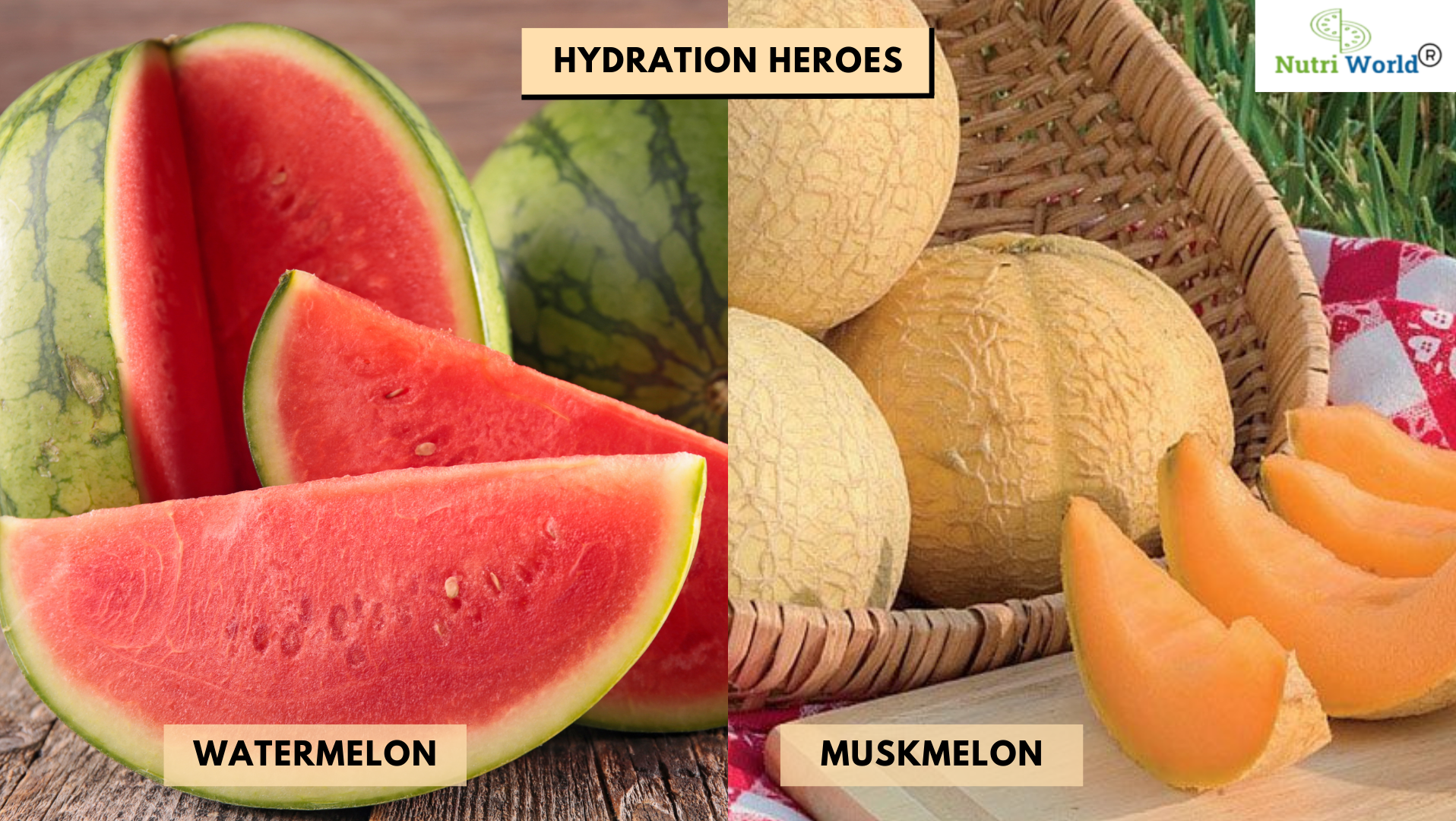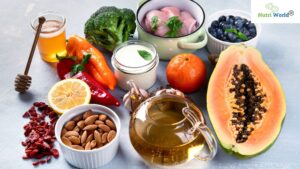By Nutriworld | Dt. Dipanwita Saha
When the sun is blazing and temperatures soar, your body craves hydration—not just from water, but from water-rich, cooling foods. Among nature’s best summer gifts are two sweet, juicy favorites: watermelon and muskmelon.
Both fruits are known for their high water content, refreshing taste, and impressive health benefits. But when it comes to hydration, nutrition, and overall well-being, which one should you reach for?
As a nutritionist, I often get asked: Watermelon vs muskmelon—what’s the better choice? Let’s explore their hydration power, nutritional values, and how they support your health, skin, and immunity.

Water Content: Who Wins the Hydration Game?
🍉Watermelon – The Hydration King
- Contains 92% water
- Refreshes the body instantly
- Helps reduce body heat and prevent dehydration
- Ideal after workouts or long outdoor exposure
🍈Muskmelon – The Close Competitor
- Contains 89–90% water
- Offers hydration with a milder sweetness
- Supports skin hydration and digestive comfort
Verdict: Watermelon wins in terms of sheer water content, making it slightly more hydrating.
Benefits for Skin and Hair
Hydrates Skin from Within :-
With its 92% water content, watermelon keeps your skin hydrated, plump, and radiant. Proper hydration helps prevent dryness, flakiness, and dullness.
Rich in Lycopene :-
Lycopene is a powerful antioxidant that helps protect skin from UV damage and environmental stressors, reducing the risk of sunburn and premature aging.
Promotes Collagen Production :-
Watermelon contains vitamin C, which plays a crucial role in the formation of collagen—the protein responsible for skin firmness and elasticity.
Boosts Scalp Circulation :-
The amino acid citrulline in watermelon improves blood circulation, which can nourish hair follicles and support healthy hair growth.
Fights Acne and Oiliness :-
Watermelon is light, non-comedogenic, and naturally detoxifying. It helps clear out excess oils and flush toxins, reducing the chances of acne breakouts.
Also Read:
Muskmelon: Skin & Hair Benefits
High in Vitamin C
Muskmelon is rich in vitamin C, which enhances collagen synthesis, improves skin texture, and aids in faster wound healing or reduction of blemishes.
Supports Natural Glow
With its combination of beta-carotene, vitamin A, and hydration, muskmelon contributes to an even skin tone, reduced pigmentation, and a healthy summer glow.
Strengthens Hair Roots
Vitamin A in muskmelon plays a key role in sebum production, which keeps the scalp moisturized and supports strong, shiny hair.
Prevents Hair Thinning
The presence of potassium and antioxidants helps manage oxidative stress and improves hair thickness by stimulating better circulation to the scalp.
Anti-Aging Benefits
Beta-carotene acts as a natural anti-aging nutrient, helping reduce the appearance of fine lines and wrinkles by fighting free radicals and improving skin elasticity.
Muskmelon : Digestive and Metabolic Benefits
High in Dietary Fiber
Muskmelon is an excellent source of soluble and insoluble fiber, which supports smooth digestion, improves gut motility, and helps relieve constipation naturally.
Promotes Gut Health
The fiber in muskmelon nourishes the gut microbiome, promoting the growth of beneficial bacteria and reducing digestive inflammation.
Natural Digestive Enzymes
Muskmelon contains enzymes like cucumisin, which aid in breaking down proteins and improving nutrient absorption—especially helpful after heavy meals.
Balances Blood Sugar Levels
Despite its natural sweetness, muskmelon has a low glycemic load, which makes it suitable (in moderation) for those managing blood sugar levels and metabolic health.
Supports Weight Management
With high water content and low calorie density, muskmelon helps increase satiety, making it ideal for weight-conscious individuals or those on metabolic diets.
Also Read:
Watermelon: Digestive & Metabolic Benefits
Light and Easy to Digest
Watermelon is over 92% water, making it incredibly hydrating and gentle on the stomach, especially during hot weather or digestive discomfort.
Colon Hydration and Mild Laxative Effect
Its high water content supports colon hydration, which can aid mild constipation and promote regular bowel movements.
Supports Detoxification
Watermelon contains citrulline, which assists in flushing out toxins through the kidneys, enhancing metabolic detox pathways.
May Cause Bloating in Sensitive Individuals
Due to its high FODMAP content (fructose and polyols), watermelon may lead to bloating or gas in those with irritable bowel or fructose malabsorption.
Low in Fiber
While hydrating, watermelon is low in fiber, so it may not provide the same digestive bulk or sustained satiety as muskmelon.
Best Ways To Eat Watermelon & Muskmelon
Enjoy Fresh and Raw
Always eat these fruits in their whole, natural form rather than juicing them. This helps retain their fiber content and slows down sugar absorption in the body.
Eat on an Empty Stomach
Consuming muskmelon or watermelon first thing in the morning or as a mid-evening snack allows for better digestion and nutrient absorption without interference from heavy meals.
Avoid Dairy Combinations
Do not pair these fruits with milk, curd, or other dairy products, as it may cause fermentation and indigestion due to differing digestion speeds.
Keep It Simple and Seasonal
Avoid fancy recipes or over-processing. Stick to simple, chopped fruit, and eat them during their peak summer season for maximum freshness and nutritional value.
Enhance with Digestive Spices
Add a pinch of black salt, roasted cumin, or fresh mint leaves to elevate the taste and support digestion, especially if you’re prone to bloating or acidity.
Final Takeaway: Which is Better?
Muskmelon takes the lead in gut health, fiber support, and metabolic stability, making it an excellent choice for those focusing on digestion, weight management, or blood sugar balance.
Watermelon, on the other hand, shines in hydration and detoxification, perfect for post-workout recovery, cleansing, and staying cool during the summer.
Nutritionist’s Tip:
For holistic digestive and metabolic health, include both fruits in your summer diet. Enjoy muskmelon for fiber-rich meals and watermelon for hydration and refreshment—both are hydration heroes with powerful health benefits.
FAQs
1. Can watermelon or muskmelon affect electrolyte balance?
Yes. Both fruits, especially muskmelon, are rich in potassium and help replenish lost electrolytes. However, excessive consumption without balancing other nutrients may disrupt sodium-potassium balance, especially in people with kidney issues.
2. Is it okay to consume watermelon or muskmelon at night?
While both fruits are hydrating, eating them late at night may lead to frequent urination or bloating (especially watermelon due to its high water and FODMAP content). It’s best to consume them during the day.
3. Can muskmelon and watermelon be eaten together?
Though both are melons, they digest differently. Ayurveda recommends avoiding combining fruits of varying water content and digestion speeds, as it may cause discomfort or indigestion in some individuals.
4. Are muskmelon seeds edible and beneficial?
Yes. Dried muskmelon seeds are nutrient-dense and rich in omega-3 fats, protein, and fiber. They can help with skin health, brain function, and satiety.
5. Can these fruits trigger allergies?
Some people may experience mild oral allergy symptoms (itchiness in the mouth or throat) due to pollen-food allergy syndrome when consuming watermelon or muskmelon, especially during allergy season.

Hello! I'm Dietician Dipanwita Saha is the founder of Nutriworld and a dedicated clinical dietitian. I focus on helping individuals improve their health through personalized diet plans that are based on scientific principles. I believes that proper nutrition is crucial for healing and maintaining a balanced lifestyle, whether someone is recovering from an illness or managing a health condition
Explore Our Courses:
Subscribe to my YouTube channel for more practical diet tips, healthy recipes, and expert insights. I regularly upload videos to simplify nutrition and help you make informed food choices.








